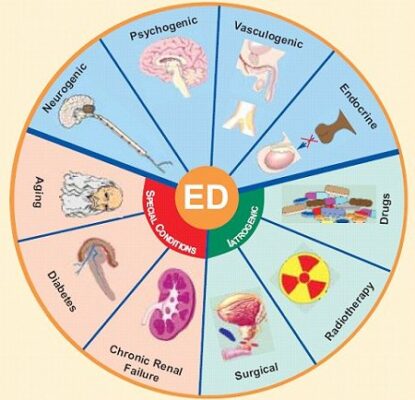Erectile Dysfunction
Understanding Erectile Dysfunction: Causes, Treatments, and Management
Understanding Erectile Dysfunction (ED) affects many men across different ages and backgrounds. This condition, defined by the persistent inability to achieve or maintain an erection sufficient for satisfactory sexual performance, can be distressing. However, it is treatable. This comprehensive guide explores the causes, diagnosis, treatment options, and preventive measures for ED, providing a thorough understanding of the condition.
What is Erectile Dysfunction?
Understanding Erectile Dysfunction refers to the consistent difficulty in achieving or maintaining an erection. Such issues can significantly impact self-esteem, personal relationships, and overall quality of life. Therefore, understanding the factors that contribute to ED is crucial for seeking appropriate treatment and support.
Causes of Erectile Dysfunction
ED arises from a combination of physical, psychological, and lifestyle factors. Here’s a detailed look at the common causes:

1. Physical Causes:
Cardiovascular Diseases: For instance, conditions like hypertension, atherosclerosis, and high cholesterol restrict blood flow to the penis, making it difficult to achieve an erection. Therefore, maintaining cardiovascular health is essential for erectile function.
Diabetes: Diabetes, over time, can damage blood vessels and nerves, leading to ED. Consequently, proper management of blood sugar levels is critical to reducing the risk of ED.
Hormonal Imbalances: Low testosterone levels or other hormonal issues can affect sexual function and libido. Hence, evaluating hormone levels may help identify and address these problems.
Medications: Certain drugs, including those for hypertension and depression, can contribute to Understanding Erectile Dysfunction (ED). Thus, discussing any medication-related concerns with your healthcare provider is important.
2. Psychological Causes:
Stress and Anxiety: Performance anxiety, work stress, or general anxiety can interfere with achieving or maintaining an erection. Consequently, stress management techniques and counseling can be beneficial.
Depression: Depression significantly impacts sexual desire and function. Therefore, therapy and medication for mental health issues may help improve erectile function.
Relationship Issues: Emotional intimacy and communication problems with a partner can also contribute to ED. In light of this, couples therapy or relationship counseling might help resolve these issues.
3. Lifestyle Factors:
Diet and Nutrition: Poor dietary habits affect overall health, including erectile function. Adopting a diet rich in fruits, vegetables, lean proteins, and healthy fats, therefore, supports cardiovascular health and erectile function.
Physical Activity: Regular exercise improves blood flow, reduces stress, and supports overall well-being. Consequently, incorporating physical activity into daily routines can help manage or prevent ED.
Substance Use: Excessive alcohol consumption and smoking can negatively affect erectile function. Therefore, reducing or eliminating these substances can improve sexual health.

Diagnosis of Erectile Dysfunction
To diagnose ED accurately, consult a healthcare professional for a comprehensive evaluation. This evaluation may include:
Medical History: Discussing your medical history, including chronic conditions, medications, and lifestyle factors, provides essential information.
Physical Examination: A physical exam assesses overall health and checks for physical causes of ED.
Blood Tests: These tests evaluate hormone levels, blood sugar, cholesterol, and other health indicators.
Psychological Assessment: In some cases, a psychological evaluation might be necessary to address any emotional or psychological factors contributing to ED.
Treatment Options for Erectile Dysfunction
Effective treatment for ED depends on the underlying cause and individual needs. Here are some common treatment options:
1. Lifestyle Changes:
Healthy Diet: Adopting a diet rich in nutrients supports vascular health and improves erectile function.
Regular Exercise: Engaging in physical activity enhances circulation, reduces stress, and improves overall health.
Stress Reduction: Techniques such as mindfulness, relaxation exercises, and therapy can help manage stress and improve sexual function.
2. Medications:
Oral Medications: For example, drugs like Viagra (sildenafil), Cialis (tadalafil), and Levitra (vardenafil) increase blood flow to the penis, helping achieve and maintain an erection.
Hormone Therapy: If hormonal imbalances are identified, hormone replacement therapy may restore normal levels.
3.Therapy and Counseling:
Psychological Counseling: Therapy can address psychological factors such as anxiety, depression, or relationship issues contributing to ED.
Sex Therapy: Specialized therapy can enhance sexual function, intimacy, and communication between partners.
4.Medical Procedures:
Penile Injections: Medications injected directly into the penis can help achieve an erection.
Vacuum Erection Devices: These devices create a vacuum around the penis, increasing blood flow and inducing an erection.
Surgery: In severe cases, surgical options such as penile implants may be considered.
Preventing Erectile Dysfunction
Although you cannot control all risk factors for ED, adopting healthy lifestyle habits can significantly reduce the risk:
Maintain a Healthy Lifestyle: A balanced diet, regular exercise, and avoiding excessive alcohol and tobacco use support erectile health.
Manage Chronic Conditions: Effectively managing conditions like diabetes and hypertension helps prevent ED.
Open Communication:** Discussing sexual health with your partner and healthcare provider can alleviate stress and improve treatment outcomes.
Conclusion
Erectile dysfunction, while common, is a manageable condition. With various treatment options available, addressing ED openly and seeking professional help can lead to effective management and improved quality of life. By understanding the causes, exploring treatment options, and making positive lifestyle changes, you can effectively manage ED and enhance your overall well-being.
